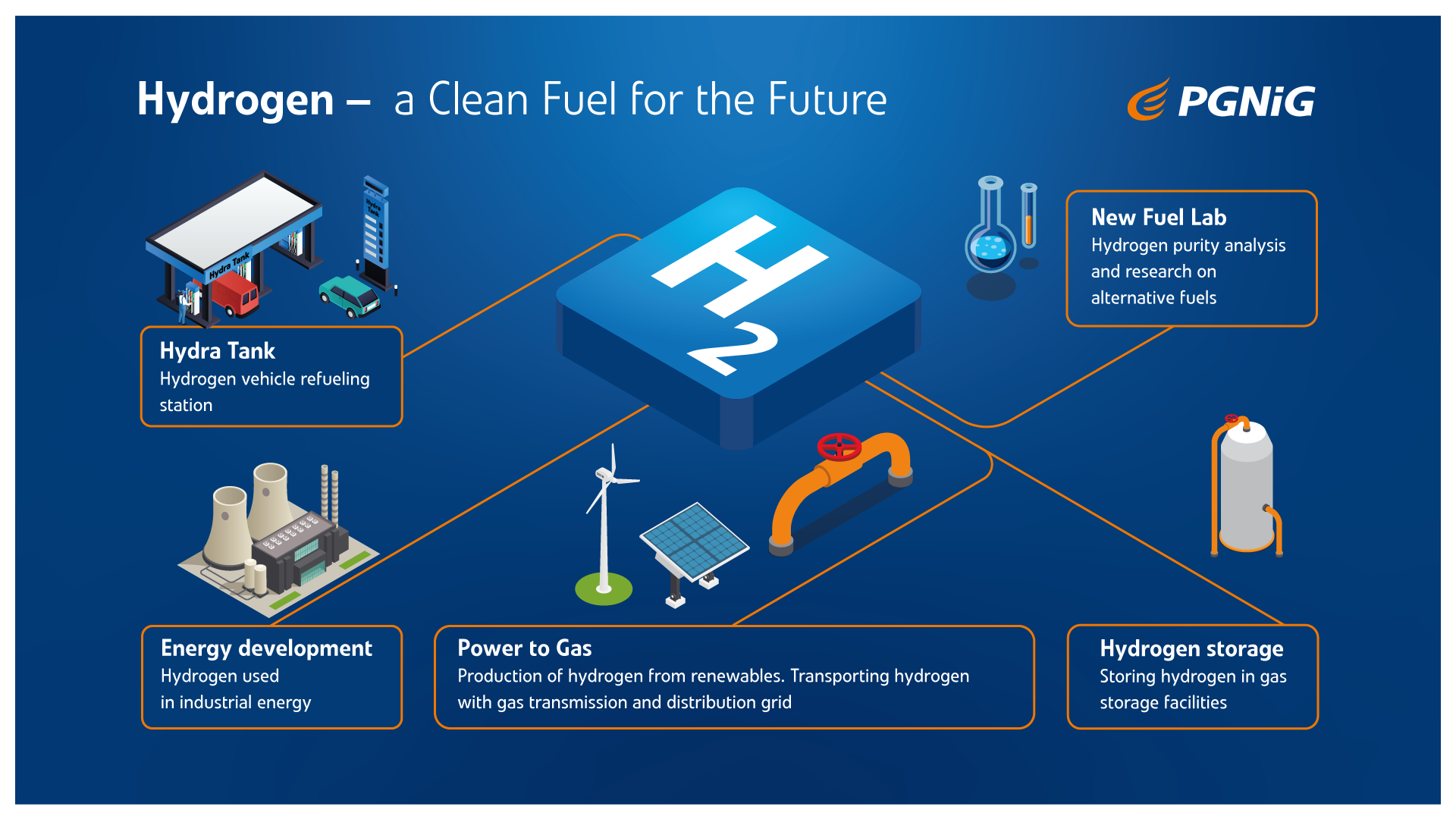News
12.05.2020 PGNiG launches new hydrogen program
Polish Oil and Gas Company (PGNiG) has started work on projects looking to use hydrogen for power generation and automotive applications. The company will explore the possibilities of storing and transmitting hydrogen through the gas network. In the future, it wants to launch commercial hydrogen sales (the “Company”) and related services. The company has just signed a contract for the design and construction of an experimental hydrogen refuelling station.
Hydrogen – Clean Fuel for the Future is PGNiG’s new comprehensive hydrogen program consisting of several projects ranging from ‘green hydrogen’ production, through hydrogen storage and distribution, to industrial power generation applications.
“In line with previously announced plans, we have taken steps enabling gradual diversification of the PGNiG Group’s business. We are set to build new hydrogen capabilities. We aim to expand our range to generate revenue from sales of a new fuel and related services and to help increase overall sales of gaseous fuels by PGNiG,” said Jerzy Kwieciński, President of the PGNiG Management Board. “By implementing the hydrogen projects in the pipeline, PGNiG will contribute to expanding the market for alternative fuels and thus will contribute to Poland’s fulfillment of EU climate policy goals,” added Mr Kwieciński. PGNiG plans to spend in excess of PLN 31m on research under the new program over the next four years.
Fuelling station
The most advanced project is Hydra Tank, comprising an experimental hydrogen refuelling station. PGNiG has already signed a contract with a consortium of Polish- and UK-based companies to design and build the station. Slated for launch in 2021, the facility will be located at ul. Prądzyńskiego in the Wola District of Warsaw, in the vicinity of the existing CNG (compressed natural gas) filling station.
“The initial period of operation will be a pilot test for PGNiG, combined with research work,” said Arkadiusz Sekściński, Vice President of the PGNiG Management Board for Development. “We want hydrogen to complement PGNiG’s existing range of fuels, including CNG and LNG, to drive advancement of gas mobility in Poland,” Mr Sekściński added.
Production of hydrogen from renewable sources, storage and distribution
PGNiG has started investigating the possibility of storing and transmitting hydrogen using the natural gas network. A ‘green hydrogen’ production facility is to be built by the company’s branch in Odolanów under the InGrid – Power to Gas project. It is scheduled to come on stream in 2022. PGNiG intends to use electricity generated by photovoltaic panels for the purpose of the project.
“The facility will allow us to test the entire process, from production to delivery of green hydrogen to customers. It will enable us to run tests consisting in injecting a proper mixture of natural gas and hydrogen into an on-site model gas network, storing hydrogen and carrying it by tanker to our station in Warsaw,” explained Arkadiusz Sekściński, Vice President of the PGNiG Management Board.
The PGNiG Central Measurement and Testing Laboratory will expand its analytics capabilities to become the first laboratory in Poland and one of the few in Europe providing a hydrogen purity testing service. Once it is accredited, the lab will test alternative fuels for PGNiG, also providing the testing service to third parties on a commercial basis.
“The new hydrogen program is one example of PGNiG’s shift towards green energy. Over the next two to three years we want to create a coherent chain of hydrogen capabilities, enabling further growth in this field,” noted PGNIG CEO Jerzy Kwieciński.
PGNiG recognises the potential of using hydrogen for industrial power generation applications. The gas can be used in heat and power generating units on an industrial scale. State-of-the-art turbines in combined heat and power plants can run on properly designed natural gas and hydrogen blends to produce heat and electricity. Hydrogen can also be used by other large industrial plants.



